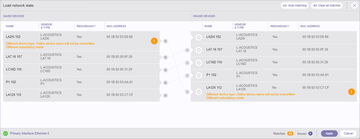Milan Manager 2.4 brings Studio Compatibility and Faster Workflows
Milan Manager continues to benefit from frequent, feature-rich updates, and version 2.4 is no exception. This latest release introduces significant enhancements that make the software more versatile than ever, extending its reach beyond live sound into studio and music creation environments.
What’s New in 2.4
- 44.1 kHz CRF Stream Support
For the first time, Milan Manager supports media clocking at 44.1 kHz, enabling seamless integration with devices used in studio and MI workflows. This means one-click configuration of media clocking is now available for environments requiring 44.1, 88.2, or 176.4 kHz operation. - Quick-select Groups
Save time and reduce errors by grouping devices for fast multi-selection and control. Whether managing amplifiers for a line array or other configurations, quick-select groups make system adjustments easier and more efficient. - Keyboard Shortcuts
Speed up your workflow with new shortcuts for common operations, allowing quicker navigation and control without relying solely on mouse clicks. - Estimated Cable Lengths (BETA)
Gain insight into your network setup with estimated cable lengths displayed in the network diagram. This beta feature helps identify discrepancies between physical and reported configurations, supporting troubleshooting and optimization.
These updates were driven by a clear motivation: to improve ergonomics and integrate user feedback. Milan Manager 2.4 makes system management faster, more intuitive, and more adaptable to diverse audio environments.
Milan Manager 2.4 is available for immediate download.
Milan Manager 2.3 is Here
We’re pleased to announce the release of Milan Manager 2.3, bringing powerful new capabilities and expanded device support to help you stay ahead in managing Milan- enabled networks.
What’s New in 2.3?
Support for Milan 1.3 Devices
Milan Manager now supports devices implementing the Milan 1.3 specification. This update ensures compatibility with the next generation of Milan-enabled hardware.
While Milan 1.3 devices are not yet widely available, this release ensures Milan Manager is ready to manage them as they enter the field—future-proofing your workflows and minimizing disruption when these devices become more common.
Smarter Configuration Application
You can now apply a saved network state to a device of a different type or redundancy mode—provided it has the same number of streams and channels.
This unlocks:
- Flexible redundancy mode changes without rebuilding stream connections
- Failsafe operation by allowing device substitution (e.g., replacing a faulty amplifier with a spare one of another type)

This enhancement streamlines workflows and improves resilience in touring and installed environments.
Expanded Offline Device Database
We’ve added support for new Avnu-certified devices in the offline database, making system planning even more versatile:
- d&b audiotechnik 25D and D25
- L-Acoustics LA1.16i
These additions help you design and configure systems even when you're working offline.
Milan Manager 2.3 is all about future-readiness, flexibility, and reliability. Whether you're designing systems, troubleshooting networks, or preparing for the next generation of Milan-enabled devices, this update ensures you're equipped for what’s next.
